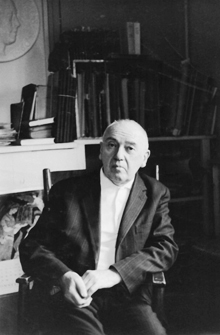Jean Grenier
Jean Grenier (born February 6, 1898 in Paris , † March 5, 1971 in Dreux-Venouillet , Département Eure-et-Loir ) was a French writer, philosopher and art critic. He preferred contemplation to social engagement - as represented by his student Albert Camus . In Germany he is largely unknown despite the publication of his prose volume The Islands by Suhrkamp Verlag (1985).
Life
Growing up in the Breton city of Saint-Brieuc , Grenier completed his philosophy studies in Paris in 1922. His friends included Louis Guilloux (a compatriot), Henri Bosco , Edmond Lambert , Max Jacob and soon Jean Paulhan , for whose magazine Nouvelle Revue Française Grenier would write when he was still old. This youth period was reflected in Les grèves in 1927 , which, in addition to narrative fragments, contains various reflections and portraits. For Kindler's Neues Literaturlexikon it is Grenier's most demanding work.
Turning away
During a longer period of teaching in Algiers (1930–1938), the philosophy teacher became aware of his student Albert Camus , with whom he became friends until his accidental death in 1960, despite differing attitudes towards life. Camus wrote an enthusiastic preface to Grenier's Islands (1933). According to Camus, under the influence of this book, he began writing himself. However, while the student embarked on a revolutionary course, Grenier preferred throughout his life self-reflection and endurance in the spirit of Taoism and thus rather a departure from historical machinery. This “program” is concentrated in Grenier's Essai sur l'esprit d'orthodoxie from 1938. It also shines through in his book Sous l'occupation with observations and portraits from the occupation, which appeared in 1997 posthumously. He does not believe in the effectiveness of active resistance, can be read in it at the beginning.
In Camus' newspaper Combat Grenier denied a column on art and literature. He was particularly interested in contemporary (non-representational) painting, which was also reflected in several books. In 1970 he drew an art-historical sum in L'art et sesproblemèmes . He had another column in Jean Daniel's L'Express . After teaching positions at universities in Alexandria , Cairo and Lille , Grenier was appointed to the Paris Sorbonne in 1962 , where he held the chair of aesthetics until 1968. That year he received the Grand Prix national des Lettres . Since 1964 he also worked as a consultant for the Gallimard publishing house. His friends now also included Camus' widow Francine and the two writers André Malraux and Manès Sperber . Grenier spent his old age not far from Paris in Bourg-la-Reine .
On the edge
Grenier did not develop a philosophical system. The fragile subsurface of his observation and reflection was "his experience of the threat to existence, his scent for the nothingness lurking everywhere, his feeling that he was only allowed marginally and only at a distance", as Kindler's New Literary Dictionary says - only on islands . He does not seek to persuade or to seduce; He asked for attention to the minor, to the extraordinary in the very minor, for example the death of a dog (diary-like notes, published in 1957).
Works (selection)
- Les iles , Paris 1933, German The Islands , Frankfurt / Main 1985, The Islands and other texts , Freiburg / Munich 2015
- La philosophie de Jules Lesquier , Vrin, 1936
- Essai sur l'esprit d'orthodoxie , Paris 1938
- Inspirations méditerranéennes , 1940
- Le Choix , Presses Universitaires de France, 1941
- Entretien sur le bon usage de la liberté , Paris 1948
- L'esprit de la peinture contemporaine, suivi de quelques études sur Braque, Chagall, Lhote , Lausanne 1951
- A propos de l'humain , Paris 1955
- Les Greves , Paris 1957
- L'existence malheureuse , Paris 1957
- Sur la mort d'un chien , Paris 1957
- L'esprit du Tao , Flammarion, 1957
- Essais sur la peinture contemporaine , Paris 1959
- Albert Camus, souvenirs , Paris 1968
- L'art et sesproblemèmes , Editions Rencontres, 1970
- Published posthumously
- Carnets , Diaries / Notes 1944–1971, Paris 1994
- About India , Berlin 1995
- Sous l'occupation , Ed. Claire Paulhan, 1997
Further information can be found in the French Wikipedia
Literature (selection)
- Nouvelle Revue Francais No. 221, May 1971 (special issue on Grenier)
- JST Garfitt: The Work and Thought of Jean Grenier , London 1982
- Jacques André (ed.): Les instants privilégés, Jean Grenier , Paris 1992.
- Albert Camus - Jean Grenier: Correspondence 1932-1960 , University of Nebraska Pr., 2003; German correspondence 1932-1960. With Jean Grenier's memories of Albert Camus , Freiburg / Munich 2013.
- Toby Garfitt: Jean Grenier: un écrivain et un maître, contribution à l'histoire intellectuelle du vingtième siècle , Editions La Part Commune, Rennes 2010
Further information can be found in the French Wikipedia
Individual evidence
- ^ Edition Munich 1988
- ↑ The "orthodox" is primarily aimed at dogmatic Marxism
- ↑ persee , accessed on May 17, 2011
- ↑ a b Grenier
| personal data | |
|---|---|
| SURNAME | Grenier, Jean |
| BRIEF DESCRIPTION | French writer, philosopher and art critic |
| DATE OF BIRTH | February 6, 1898 |
| PLACE OF BIRTH | Paris |
| DATE OF DEATH | March 5th 1971 |
| Place of death | Dreux-Venouillet , Eure-et-Loir department |
